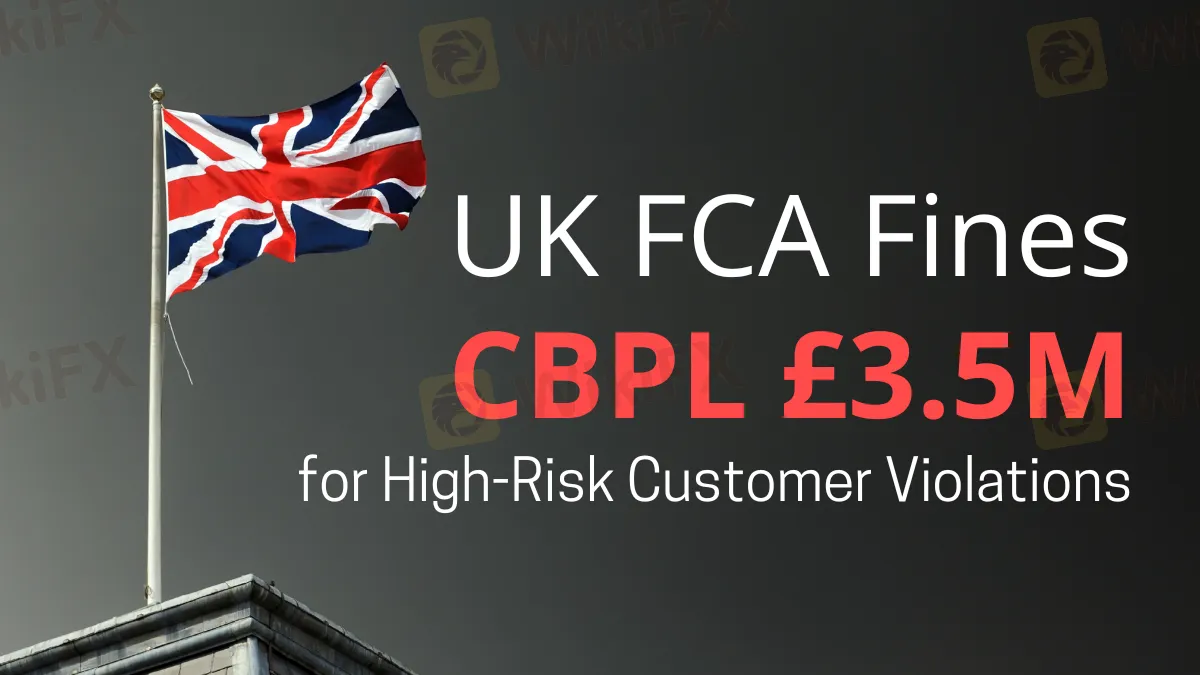简体中文
繁體中文
English
Pусский
日本語
ภาษาไทย
Tiếng Việt
Bahasa Indonesia
Español
हिन्दी
Filippiiniläinen
Français
Deutsch
Português
Türkçe
한국어
العربية
UK FCA Fines CBPL £3.5M for High-Risk Customer Violations
Abstract:The UK FCA has fined CBPL £3.5M for onboarding high-risk customers, violating regulatory requirements, and weak financial crime controls.

The Financial Conduct Authority (FCA) fined CB Payments Limited (CBPL), a member of the Coinbase Group, £3,503,546 for failing to comply with regulatory standards. The good outcomes of CBPL's inability to follow guidelines prevented it from providing services to high-risk clients.
CBPL provides a worldwide crypto asset trading platform but does not directly handle crypto-asset transactions. Instead, it allows customers to access these transactions via other Coinbase Group firms. CBPL needs to be registered in the United Kingdom to conduct crypto-asset transactions.
CBPL Exceeds High-Risk Levels
Following negotiations with the FCA, CBPL agreed on a voluntary requirement (VREQ) in October 2020. This criterion was motivated by worries regarding the efficiency of CBPL's financial crime control structure. The VREQ expressly forbade CBPL from onboarding new high-risk clients until its control mechanisms could be improved.
Despite this prohibition, CBPL accepted and served 13,416 high-risk clients with e-money services. Approximately 31 per cent of these consumers made deposits totalling USD 24.9 million. These monies were then utilized for withdrawals and crypto asset transactions via other Coinbase Group firms, totalling about USD 226 million.

CBPL violated the VREQ by failing to develop, test, implement, or monitor appropriate controls, resulting in the first FCA fine under regulations. The company should have considered all possible onboarding techniques and effectively monitored compliance. As a result, several severe breaches went unnoticed for almost two years.
Therese Chambers, the FCA's Joint Executive Director of Enforcement and Market Oversight, underscored the seriousness of the situation: The money laundering concerns linked with cryptocurrency are evident, and enterprises must take them seriously. Firms that support crypto trading, such as CBPL, must have rigorous financial crime controls.
Chambers said, “CBPL's controls had major flaws, which is why the restrictions were enforced. CBPL, on the other hand, consistently violated these rules. This enhanced the likelihood that criminals would utilize CBPL to launder their money. We will not allow such leniency, which endangers the integrity of our markets.”
Conclusion
This is the FCA's first enforcement action under the 2011 Electronic Money Regulations. CBPL agreed to remedy the situation, which resulted in a 30% reduction in the punishment. The FCA's decisive action emphasizes the significance of financial solid crime controls in the fast-changing crypto asset business.
For trending news, access the daily news on the financial market here.

Disclaimer:
The views in this article only represent the author's personal views, and do not constitute investment advice on this platform. This platform does not guarantee the accuracy, completeness and timeliness of the information in the article, and will not be liable for any loss caused by the use of or reliance on the information in the article.
Read more

Bank Negara Malaysia Flags 12 New Companies for Unauthorised Activity
Bank Negara Malaysia (BNM) has updated its Financial Consumer Alert List (FCA List) by adding 12 more entities, reinforcing its efforts to warn the public against unregulated financial schemes. Check if your broker made the list!

TradingView Brings Live Market Charts to Telegram Users with New Mini App
TradingView has launched a mini app on Telegram, making it easier for users to track market trends, check price movements, and share charts.

Georgia Man Charged in Danbury Kidnapping and Crypto Extortion Plot
Georgia man James Schwab charged in Danbury kidnapping tied to $230M crypto heist. Plot targeted couple for ransom after Miami altercation with son.

Bybit Shuts Down NFT Marketplace Amid Crypto Market Downturn
Bybit announces the closure of its NFT marketplace, citing efforts to streamline offerings. Discover the latest trends in the declining NFT market and its shift to utility-based growth.
WikiFX Broker
Latest News
Exposing the Top 5 Scam Brokers of March 2025: A Closer Look by WikiFX
Gold Prices Climb Again – Have Investors Seized the Opportunity?
Webull Launches SMSF Investment Platform with Zero Fees
Australian Regulator Warns of Money Laundering and Fraud Risks in Crypto ATMs
The Withdrawal Trap: How Scam Brokers Lure Victims into Paying More
FCA to Investors: Think Twice Before Trusting These Brokers
Trump\s tariffs: How could they affect the UK and your money
Trump gambles it all on global tariffs he\s wanted for decades
TradingView Brings Live Market Charts to Telegram Users with New Mini App
HTFX Spreads Joy During Eid Charity Event in Jakarta
Currency Calculator







